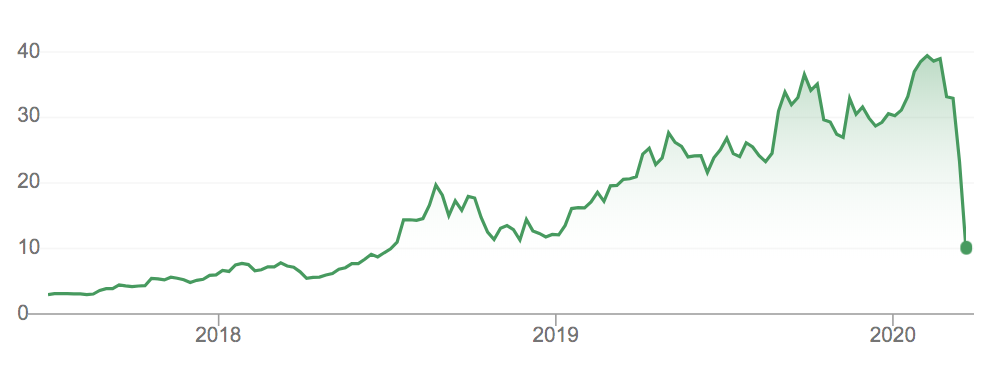The Afterpay Ltd (ASX: APT) share price was trading 22% lower today following a 33% fall yesterday.
In terms of dollar value and percentage fall for an Australian tech company, this is one of the biggest drops I’ve ever seen…
APT share price

For context, the broader Australian share market or S&P/ASX 200 (ASX: XJO) was trading down 3.44% today, so it was a bad day. Just like yesterday, and last week.
But, so far, Afterpay has fallen around 75% from its peak — just a couple of months ago.
This. Hurts.
Who is Afterpay?
Afterpay Touch is the owner of the popular “buy now, pay later” app. As of 2020, Afterpay had over 7.5 million registered users worldwide, making it one of Australia’s true technology success stories.
In the Rask video above I explain the difference between price and value, how analysts calculate valuations for shares or entire companies and how you can do it too. The video comes from our free valuation course.
The real reasons Afterpay shares are down
There is rarely a time when a company’s shares fall so hard for just one single reason.
I think the recent falls are a combination of quite a few factors:
A very high valuation to begin with.
A few months back it seemed to me that investors in Afterpay had ‘baked in’ extreme success in the huge USA buy now, pay later (BNPL) market. The recent issues have severely dented that optimism and the likelihood of success in the USA.
A market crash.
The share market has crashed. No question.
Uncertainty is playing a massive role in causing people to sell shares at bargain prices because they are not price-conscious. Right now is probably the worst time to be a seller that I’ve seen. Period.
Glass half full, however, it might be the best time to be a long-term buyer of shares.
Ripple effect from massive liquidations.
What most small stock investors (like me) don’t realise is that many fund managers owned Afterpay stock.
While we — individual shareholders — may not be forced to sell our shares because we have our finances in order and we recognise the long-term value of buying shares, some big investors are now being forced to sell their assets.
For example, let’s say a huge pension fund like AustralianSuper has 2 million members wanting to go “all cash” because they’ve panicked.
If 1 million members — or even 100,000 — were ‘balanced’ (i.e. 40-60% invested in shares) before they swapped out to 100% cash (0% shares), that’s a truckload of shares being sold by fund managers (e.g. AustraianSuper) that have to honour their client’s wishes.
(Please note: if you’re investing for 20 or 30 years inside Super, meaning you can’t touch the money for decades, I think it is completely nuts to go all cash).
The medium-term view of Afterpay’s growth appears to be worsening.
While management came out this week and said things look ok from a funding point of view, investors are clearly lowering their expectations for growth in the 12 months to 5-year timeframe because of the likely consequences that most less affluent people in Australia, Europe and the US are not going to use its services.
Few analysts can value Afterpay shares properly.
Finally, most investors (and some seemingly smart analysts) that I speak to or have read about online or in reports have little idea about how to price the risk of investing in Afterpay.
While the company tells us they have sophisticated ways to minimise bad debts accruing from people cannot repay their debts (and I tend to believe them), it’s a very hard thing for analysts to price before a major credit issue.
To be clear, investors and analysts are paid to price uncertainty in their models but I would never invest in a company when it’s ‘central question’ (i.e. it’s core reason for existing) is too hard for me to understand with conviction.
What to do now?
I imagine lots of my Rask Invest members will be asking me about Afterpay shares and what to do with their shareholding when I release my video update this weekend.
We’ve long provided coverage of Afterpay to our members and even our extended free community (i.e. those reading Rask Media articles) but we’ve never made it a formal share idea for our members because, put simply, I cannot tell you with conviction what the true downside is at any point in time.
Context would help…
Compare Afterpay with, say, Pushpay Holdings Ltd (ASX: PPH), a company I own, or even Altium Limited (ASX: ALU), a company that I cover in my free cloud investment research report.
Those two businesses have the beautiful SaaS-style economics just like Afterpay does, but they do not have the credit-like tail risk that comes with short-term lending.
So I guess the real hard question is: ‘what do investors do now?’
I believe Afterpay could go on to be flourishing short-term lending business and advertising giant if it gets through the next 12 months.
To be brutally honest however, given the uncertainty, while it might be ‘okay’ for a 1% or 2% “punt” in my portfolio; right now, I think there are better places for me to invest my capital.
I could be completely wrong — and I hope for shareholders’ sake it bounces back big time — but I really can’t tell you what its shares are worth (intrinsically) in the current environment. And I doubt many/any people can right now.
If you know something I don’t, I’d really love to hear about it.
Thanks for reading. To get my cloud stocks report, see below.
P.S. if you’re feeling anxious about your money or life in general, please reach out to the National Debt Helpline (1800 007 007), Beyond Blue or email me and I’ll see what we can do to help. Watching our savings and investments fall so hard and fast is a terrible feeling. But you are not alone.
[ls_content_block id=”14948″ para=”paragraphs”]
Disclosure: At the time of publishing, Owen owns shares of Pushpay.








